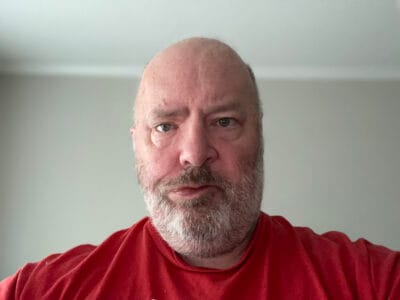I’m Still Here
For as long as he can remember, Samuel has battled with intrusive thoughts that made him feel like life wasn’t worth living. While his recovery has not been linear, Sam has learned that he is not alone with his thoughts and that his life is worth fighting for.

Story
I still remember the first time I encountered the accusatory thoughts. I was six years old and was just starting second grade. That previous summer, I had been attacked and nearly killed by a dog. I looked awful from all the swelling and scars on my head.
A kid in my class confronted me. “What happened to your face?”
“You should be dead.” That was the thought that came to me toward myself.
“You should be dead.” That was the thought that came to me toward myself. Then another: “Nobody wants anything to do with you.” I had always lacked any confidence in myself, so this was not the jarring surprise it maybe should have been. It may have been connected to my father, a harsh man who had his own battle with schizophrenia throughout his short life. At his worst, he was very belittling to my sisters and me. He would sneer at report cards that contained any grade less than an A, and a beating was assured if any of us stepped out of line in any way.
I walked away in the wake of these thoughts without responding to him. “FREAK!” the classmate yelled. Other kids laughed at me.
“See!?” Came the next thought. In condemning me, the external voices found agreement with my inner voices.

I wondered if I should tell my parents but thought better of it. I didn’t think there was much they could do about it anyway. Back in the 1960s, bullying wasn’t an issue, not to the degree it is now among some people. At least that’s the way it was where I lived. I never brought it up because I knew my dad would react negatively, insisting that I stand up for myself and fight back when I just wanted it to stop. Besides, my home life was usually one of walking on eggshells, afraid that my dad would erupt again. My mother was an abused woman, and she knew better than to cross Dad. Seven years later, following a suicide attempt, I saw a psychiatrist and was first diagnosed with depression.
The battles with my thoughts only intensified. “You never should’ve been born.” “You are a burden to all who know you.” “You’re a waste of space.” On and on it went. It helped to know that I had a diagnosis, and the parade of meds I’ve been prescribed over the years has helped somewhat. But the thoughts have always been with me. I’ve come to expect them with every misfortune or bad break.
I wish I could say there’d been a turning point. There hasn’t been one. Even with all the meds, the hospitalizations, the suicide attempts, all that—it’s just been an ongoing battle.
It’s not always a battle I fight alone, though. I have found that making lifelong friends and relying upon family members has helped. Those who understand what I go through (whether they are going through something similar or not) have been a comfort to me because they reach out and make me promise to reach out to them when things get bad. I’ve also figured out how to channel my thoughts when they get too noisy by steering my mind to other thoughts. It took me years to learn that, and it has really helped me.
So, I’m still here. At times I have no idea why that is, but it’s true. And there are times, in the midst of those battles, when that has to be enough.
So, I’m still here. At times I have no idea why that is, but it’s true. And there are times, in the midst of those battles, when that has to be enough. Oddly enough, now I feel a certain sympathy for my father and his lifelong illness. Shortly before he died, he was living on the street. Right before I graduated from high school, he returned home to gather some things and found me there. He sat down and told me about his past, which was filled with horrors. It seemed the patterns of abuse were passed down from before him. At that moment, in a strange way, I really felt for my dad and understood to some extent how he had come to be the person he was—a broken man living with a debilitating mental illness who sometimes took it out on his own family.
For those who are fighting a similar battle, I hope you have people you can rely upon and you are receiving good medical care for your conditions. Above all, I hope you’re still here, too.
About the contributor
Samuel Gaines is an old dude from North Carolina. He enjoys good and bad movies, dogs and cats, and good food.